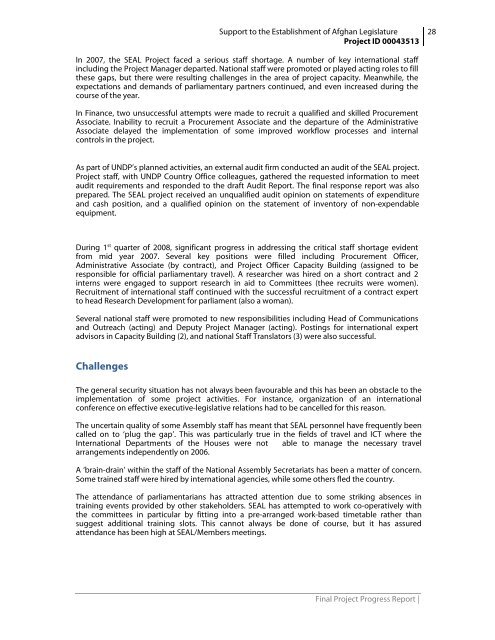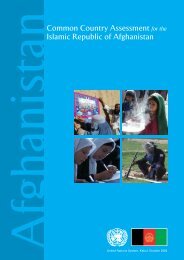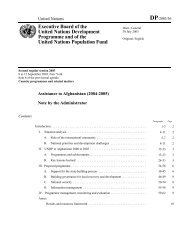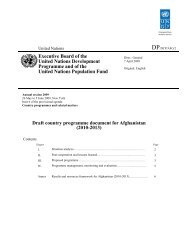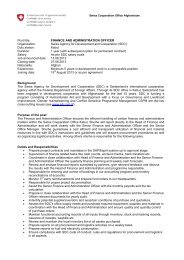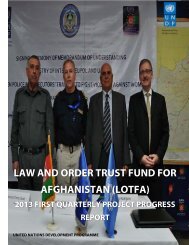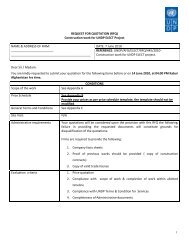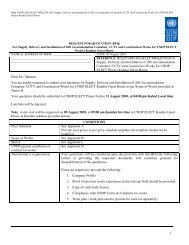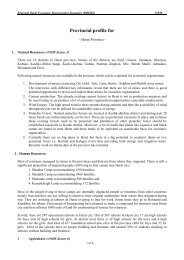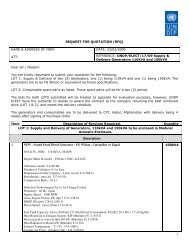Final Report of SEAL I - UNDP Afghanistan
Final Report of SEAL I - UNDP Afghanistan
Final Report of SEAL I - UNDP Afghanistan
Create successful ePaper yourself
Turn your PDF publications into a flip-book with our unique Google optimized e-Paper software.
Support to the Establishment <strong>of</strong> Afghan Legislature<br />
Project ID 00043513<br />
28<br />
In 2007, the <strong>SEAL</strong> Project faced a serious staff shortage. A number <strong>of</strong> key international staff<br />
including the Project Manager departed. National staff were promoted or played acting roles to fill<br />
these gaps, but there were resulting challenges in the area <strong>of</strong> project capacity. Meanwhile, the<br />
expectations and demands <strong>of</strong> parliamentary partners continued, and even increased during the<br />
course <strong>of</strong> the year.<br />
In Finance, two unsuccessful attempts were made to recruit a qualified and skilled Procurement<br />
Associate. Inability to recruit a Procurement Associate and the departure <strong>of</strong> the Administrative<br />
Associate delayed the implementation <strong>of</strong> some improved workflow processes and internal<br />
controls in the project.<br />
As part <strong>of</strong> <strong>UNDP</strong>’s planned activities, an external audit firm conducted an audit <strong>of</strong> the <strong>SEAL</strong> project.<br />
Project staff, with <strong>UNDP</strong> Country Office colleagues, gathered the requested information to meet<br />
audit requirements and responded to the draft Audit <strong>Report</strong>. The final response report was also<br />
prepared. The <strong>SEAL</strong> project received an unqualified audit opinion on statements <strong>of</strong> expenditure<br />
and cash position, and a qualified opinion on the statement <strong>of</strong> inventory <strong>of</strong> non-expendable<br />
equipment.<br />
During 1 st quarter <strong>of</strong> 2008, significant progress in addressing the critical staff shortage evident<br />
from mid year 2007. Several key positions were filled including Procurement Officer,<br />
Administrative Associate (by contract), and Project Officer Capacity Building (assigned to be<br />
responsible for <strong>of</strong>ficial parliamentary travel). A researcher was hired on a short contract and 2<br />
interns were engaged to support research in aid to Committees (thee recruits were women).<br />
Recruitment <strong>of</strong> international staff continued with the successful recruitment <strong>of</strong> a contract expert<br />
to head Research Development for parliament (also a woman).<br />
Several national staff were promoted to new responsibilities including Head <strong>of</strong> Communications<br />
and Outreach (acting) and Deputy Project Manager (acting). Postings for international expert<br />
advisors in Capacity Building (2), and national Staff Translators (3) were also successful.<br />
Challenges<br />
The general security situation has not always been favourable and this has been an obstacle to the<br />
implementation <strong>of</strong> some project activities. For instance, organization <strong>of</strong> an international<br />
conference on effective executive-legislative relations had to be cancelled for this reason.<br />
The uncertain quality <strong>of</strong> some Assembly staff has meant that <strong>SEAL</strong> personnel have frequently been<br />
called on to ‘plug the gap’. This was particularly true in the fields <strong>of</strong> travel and ICT where the<br />
International Departments <strong>of</strong> the Houses were not able to manage the necessary travel<br />
arrangements independently on 2006.<br />
A ‘brain-drain’ within the staff <strong>of</strong> the National Assembly Secretariats has been a matter <strong>of</strong> concern.<br />
Some trained staff were hired by international agencies, while some others fled the country.<br />
The attendance <strong>of</strong> parliamentarians has attracted attention due to some striking absences in<br />
training events provided by other stakeholders. <strong>SEAL</strong> has attempted to work co-operatively with<br />
the committees in particular by fitting into a pre-arranged work-based timetable rather than<br />
suggest additional training slots. This cannot always be done <strong>of</strong> course, but it has assured<br />
attendance has been high at <strong>SEAL</strong>/Members meetings.<br />
<strong>Final</strong> Project Progress <strong>Report</strong> |


